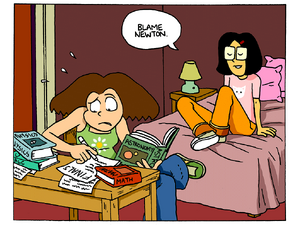| Isaac Newton | |||
|---|---|---|---|
 | |||
| Airdate | May 14, 2004
Remake: November 2021 | ||
| Curriculum | Math Science Social Studies | ||
Isaac Newton launched in BrainPOP Science, Social Studies and Math May 14, 2004.
Summary[]
At the end, Moby opens the ship's door.
Appearances[]
Transcript[]
Quiz[]
- Isaac Newton/Quiz
Quotes[]
Tim: No, not that door!
FYI[]
In Depth[]
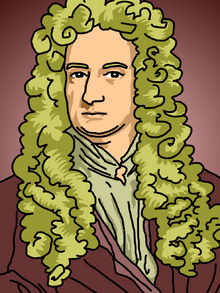
While Sir Isaac Newton’s work in physics, astronomy, mathematics and natural philosophy contributed to a more logical and ordered view of the universe, the English scientist actually placed an equal, if not greater, emphasis on his religious explorations.
Newton believed deeply in the necessity of God, and warned against the use of his scientific laws and theories to view the universe as merely a machine. “Gravity explains the motions of the planets,” he wrote, “but it cannot explain who set the planets in motion.”
Newton’s study of the Scriptures and the early Church Fathers were among his greatest passions, and he actually wrote more on religion than he did on natural science. He even tried to find hidden messages within the Bible!
But much like he did for his scientific work, Newton constantly applied the scientific method to his religious investigations, observing, hypothesizing and testing his theories to arrive at logical conclusions. To Newton, there was no separation between his scientific and religious explorations. They both had the same ultimate goal: to arrive at a better understanding of how the world functions.
Quirky Stuff[]
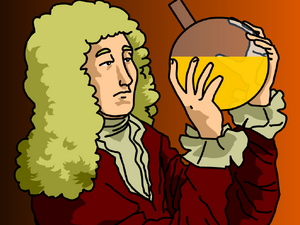
Isaac Newton: sorcerer? It might be closer to the truth than you think.
The man widely considered the greatest figure in the history of science was also a devout student of alchemy, an early form of chemistry that was part science, part mysticism. Many scientists of Newton’s time dabbled in alchemy as well—most were consumed with the idea that common metals could be turned into silver or gold, and many were also obsessed with discovering the Philosopher’s Stone, a legendary substance that was supposed to be the key to this process.
While the study of alchemy is looked upon as non-scientific and even laughable today, the greatest scientific minds of the late 17th century considered it to be a legitimate intellectual pursuit, no less valid than the study of gravity or motion. Newton’s fascination with alchemy resulted in a great deal of writing on the subject, most of which was never published (and much of which was destroyed in a laboratory fire).
But it cannot be denied that Newton’s alchemical pursuits had a major influence on his more mainstream scientific work. For instance, the idea of a hidden force acting on two objects from a distance, a distinctly alchemical notion, may very well have helped him develop his theory of gravitation.
After Newton’s death, massive amounts of mercury were found in his body, probably resulting from the numerous alchemical experiments he carried out in his laboratory—the mercury also might explain Newton’s eccentric personality in the final years of his life.
Flora And Fauna[]
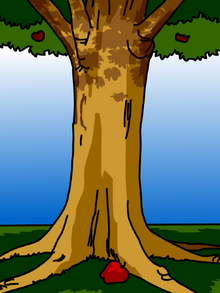
The famous apple that inspired Newton’s musings on gravity may be long gone, but the tree from which the apple fell has survived to this day—though exactly where it survived is a topic of much debate!
Various trees have been claimed as the apple tree from the famous story. The King’s School in Grantham, Lincolnshire, where Newton received his early education, claims that the tree was purchased by the school, uprooted and transported to the headmaster’s garden.
But the current owners of Woolsthorpe Manor, the birthplace of Newton, dispute this claim, insisting that the tree remains in their gardens. Regardless of who is correct, a descendant of a Woolsthorpe apple tree is currently growing outside the main gate of Trinity College in Cambridge, right below the room Newton lived in when he studied there!
Quotables[]
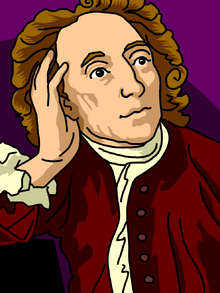
“I do not know what I may appear to the world, but to myself I seem to have been only like a boy playing on the sea-shore, and diverting myself in now and then finding a smoother pebble or a prettier shell than ordinary, whilst the great ocean of truth lay all undiscovered before me.” – Isaac Newton.
“If I have seen further it is by standing on the shoulders of giants.” – Isaac Newton.
“If I have ever made any valuable discoveries, it has been owing more to patient attention, than to any other talent.” – Isaac Newton.
“Nature and nature’s laws lay hid in night; God said ‘Let Newton be!’ and all was light.” – Alexander Pope (pictured), English poet.
“When Newton saw an apple fall, he found, in that slight startle from his contemplation, ‘tis said, a mode of proving that the earth turn’d round in a most natural whirl, called gravitation; and this is the sole mortal who could grapple, since Adam, with a fall, or with an apple.” – Lord Byron, British poet.
FYI Comic[]
